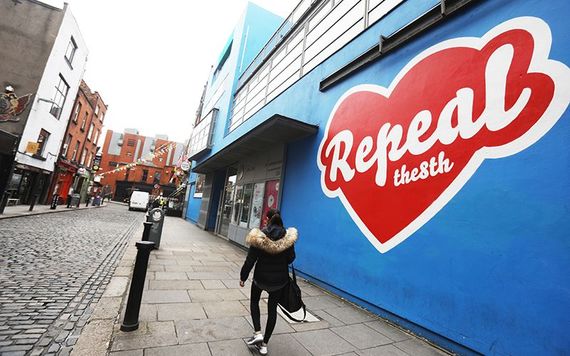I feel terrified that my beloved country is about to make one of the most tragic errors possible, writes Breda O’Brien
Editor’s note: On May 25, the Irish public will vote as to whether the country’s constitutional ban on abortion should be repealed. If the country votes 'yes,' the Irish government will be given the opportunity to legislate for abortion in Ireland. As of yet, the exact legislation to be introduced cannot be confirmed, simply that the eighth amendment as it stands will be repealed.
In this opinion piece, Irish Times columnist and patron of the Iona Institute, Breda O’Brien, tells us why she will be voting no in the upcoming referendum.
To can find an in-depth explainer on the referendum here or read a comment from the Yes side here.
As Ireland teeters on the brink of the ability to legalize abortion for any reason at all up until twelve weeks and for physical and mental health grounds up until viability, I feel terrified that my beloved country is about to make one of the most tragic errors possible.
I believe that feminism's embrace of abortion is as grievous an error as the Southern States embrace of slavery and that it will be judged by history in much the same way. Except in this instance, it is women who are being enslaved by a heartless ideology. Ireland is being seduced into abandoning a core value - that the next generation is our hope, not some kind of option, and that women always, always need a choice better than ending the life of a member of the next generation.
Read more: Ireland can no longer ignore abortion as 8th amendment on the front burner
Great crowds here at Merrion Square. Let’s look after mothers and babies! #LoveBothVoteNO pic.twitter.com/6uBNi1jRBI
— LoveBoth (Official) (@loveboth8) May 12, 2018
I believe that any civilization that urges breaking the bond of intergenerational solidarity for ideological reasons, all while abandoning women to the coldness of individual choice, is a civilization in decline.
There is huge skepticism about anyone who says, as I do, that my resistance to abortion stems from my feminism. The conventional wisdom is resistance to abortion comes from old, white men and that the patriarchy opposes abortion.
When we look at the history of abortion advocacy in the United States, that theory begins to look highly suspect. For example, few people know that Margaret Sanger, the founder of what eventually became Planned Parenthood and which is today the largest US provider of abortion, disliked abortion.
Katie introduces some of the politicians who are supporting #LoveBothVoteNO #8thref pic.twitter.com/WYbkOIwcZI
— LoveBoth (Official) (@loveboth8) May 12, 2018
She wrote in 1920: ‘While there are cases where even the law recognizes an abortion as justifiable if recommended by a physician, I assert that the hundreds of thousands of abortions performed in America each year are a disgrace to civilization.’
Sanger did have deeply disturbing eugenicist ideas, about who should be allowed to have children and who should be sterilized. However, she opposed abortion on the grounds that it was barbaric.
She was resigned to the fact that women would resort to abortion but she would not facilitate it. How different Sanger’s approach is to that of Cecile Richards, recently retired CEO of Planned Parenthood, who in 2016 earned almost a million dollars for her role.
Read more: Abortion worse than rape, says bishop
What a crowd!! #LoveBothVoteNO pic.twitter.com/i45PRPjhb7
— Caroline Simons (@carolinesimons) May 12, 2018
She aborted her fourth child, explaining in Elle magazine in 2014 that she had three adored children and she and her husband decided that was ‘as big as [their] family needed to be. That was really the story. It wasn’t anything more dramatic than that.’
Planned Parenthood began to advocate for legal abortion only after Sanger’s death when Alan Guttmacher (a man, obviously, but also vice president of the Eugenics Society) took over.
Sanger fell out with one of her biographers, Larry Lader because she refused to share his enthusiasm for abortion. Lader was the chairman of the National Association for the Repeal of Abortion Laws (now Naral - Pro-Choice America.) Lader failed to persuade Sanger, so he worked very hard to persuade his friend, Betty Friedan, to endorse abortion.

A Repeal the Eighth mural in Dublin. Image: RollingNews.ie
There was no mention of abortion in the first edition of Friedan’s book “The Feminine Mystique,” which inspired generations of feminists.
According to Ninia Baehr, author of “Abortion Without Apology: A Radical History for the 1990s,” Lader ‘saw himself as a leader of the [abortion] movement’. She said that like Dr. Bernard Nathanson, another leader of Naral at the time, Lader saw ‘ordinary women as troops and pawns in a battle masterminded by men.’ (Nathanson later regretted carrying out 60,000 abortions and changed his views on abortion entirely. He also said that he completely fabricated the numbers of women dying from illegal abortion.)
So, the patriarchy was alive and well at the very beginning of the move to legalize abortion, with men patronizing women and seeking to co-opt them to their agenda.
Even more striking were some of the early supporters of abortion, the most notorious perhaps being Hugh Hefner, founder of Playboy, whose views of women can only be described as Neanderthal.

Holly Madison, Hugh Hefner, and Bridget Marquardt. Image: WikiCommons.
Jill Filipovic, lawyer, and writer wrote in the Guardian that ‘Hefner advocated for contraception and abortion rights, sure, but because those things benefited men’s sex lives, not because they were necessary components of female freedom.’
Hefner got on the abortion rights bandwagon because he could see that if women had easy access to abortion, that they would be more available for men to have sex with. Not such a great motivation. And of course, Harvey Weinstein, the Hollywood producer accused of serial abuse and rape, was an enthusiastic Planned Parenthood supporter.
The reality is that the pro-life movement is dominated by women, and nowadays, lots of young women. In Ireland, you have Katie Ascough, former UCD student union leader who was bullied out of office by people who could not tolerate her views.
In the United States, you have Destiny Herndon-De La Rosa, of New Wave Feminists. Destiny was barred from the Women’s March in Washington, but she went anyway.
So maybe if we want to fight the patriarchy in Ireland or anywhere else, voting No to abortion is a good place to start.
Breda O'Brien is a columnist with the Irish Times and previously worked in the Sunday Business Post and as a researcher in RTÉ. She is also a second level teacher. As a twenty-something,, she was deeply influenced by a leaflet she found from Canadian feminists, which pointed out that the language used about fetuses - smaller, weaker, dependent, with no innate rights, was strikingly similar to what was said about women right into the early twentieth century.




Comments